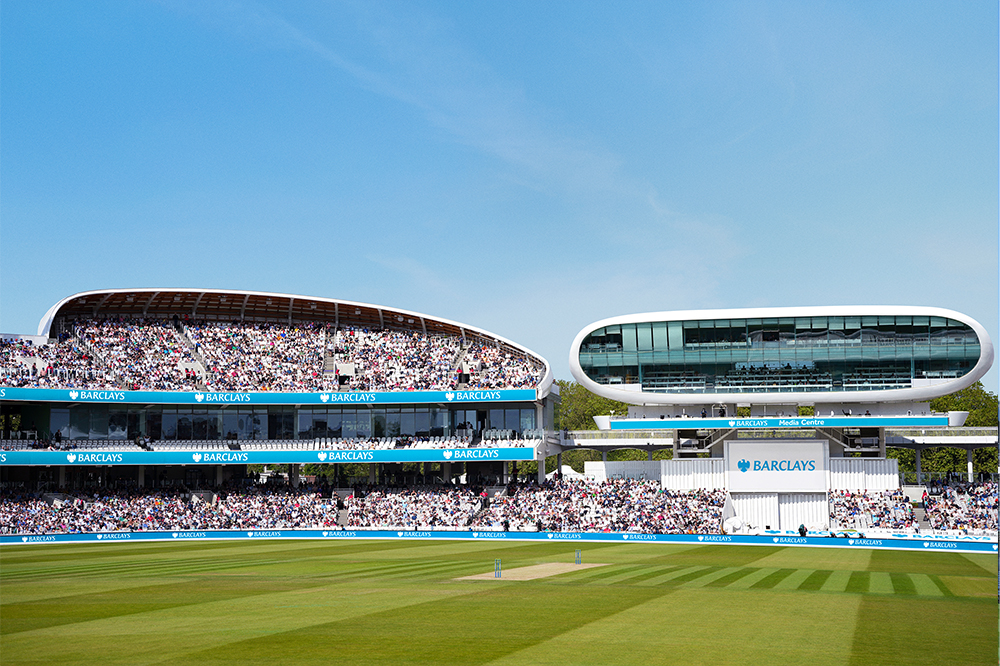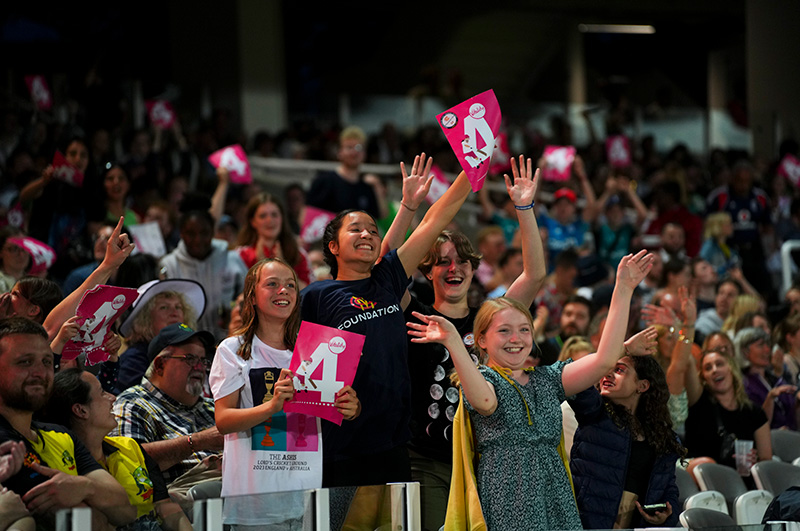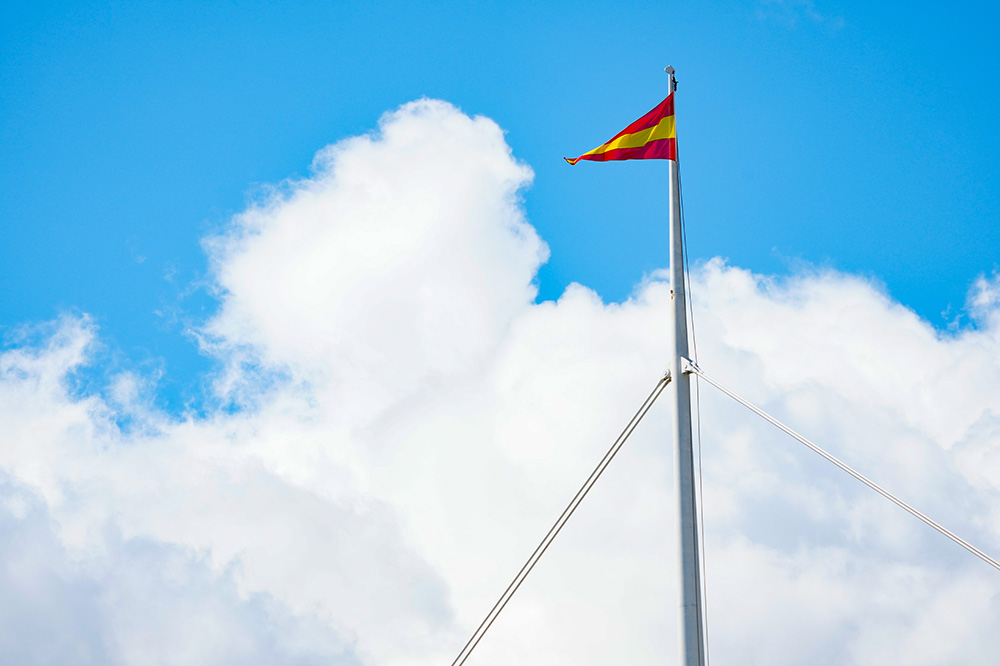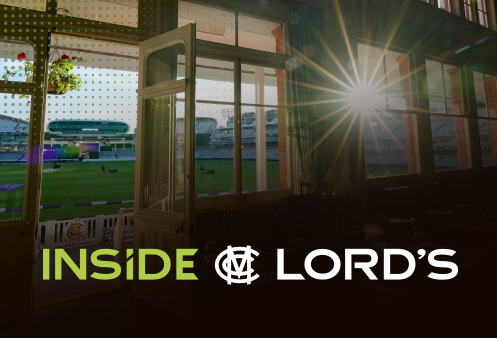World Cup Finals Part 1: The Prudential Cup Era
read story
Come here to find all the information you need to help you plan your visit to the Home of Cricket, the latest news from the Ground and to book your event.

We’ve got a wide variety of formats covered with an exciting line up of matches to get your cricket fix.
Whether you like red or white ball, domestic or international, or men’s or women’s cricket, Lord’s will have the perfect cricket experience for you, your family and friends.

Marylebone Cricket Club is the world’s most active cricket club, the owner of Lord’s Ground and the guardian of the Laws of the game. Find out more about the history of MCC, our work in the Community and the famous Lord's Museum.
FIND OUT MORE

Step closer. Your new digital platform at the Home of Cricket.
Subscribe now for early access to selected international matches, exclusive content, coaching masterclasses and many more discounts and offers.
Your access to Lord's like never before.

Marylebone Cricket Club is one of the World's most active Cricket Clubs, the owner of Lord's Ground and the Guardian of the Laws and Spirit of the Game.
With around 200 full time staff members covering a wide range of sectors - from IT to Chefs to Pavilion Stewards - there is a role at the Home of Cricket for everyone.

Posted: 21 June 2019
With the 2019 Cricket World Cup final at Lord's fast approaching, MCC Archivist Rob Curphey looks back at previous World Cups finals.
It was also now a 50-over competition and would remain so until the present day.
The format – known as the Reliance World Cup for sponsorship reasons - remained the same as the 1983 edition; two groups of 4 teams, playing each other twice, before a semi-final and final which was held at Eden Gardens in Calcutta.
In front of 100,000 spectators, the tournament’s last match was a meeting of cricket’s oldest rivalry, England v Australia, with both teams appearing in their second final and eagerly anticipating their first title.
The final was arguably the most dramatic yet. Australian captain Allan Border won the toss and put his side into bat, and Australia posted a total of 253-5, with David Boon top scoring with 75 and Mike Veletta making 45 from 31 balls.
Spinner Eddie Hemmings was England’s most successful bowler, taking 2 for 48 and as many wickets as the other five bowlers.
In reply, England had a poor start as their opener Tim Robinson was dismissed for a duck, but then rallied to 135 to 2 before the turning point of the match; Mike Gatting, facing the first ball bowled by his opposite captain Allan Border, played a reverse sweep shot that was caught by wicket-keeper Greg Dyer.
Shortly after, Bill Athey, England’s top scorer, was run out by a combination of Waugh and Bruce Reid for 58. England continued to bat and make useful partnerships but the target was just too high to achieve and in the end their total was 246-8, meaning they fell short by 7 runs.
Steve Waugh was Australia’s best bowler with figures of 2-37, slightly better than captain Border who took 2-38, the best bowling performance by a captain in the final.
Boon’s innings of 75 gave him the Man of the Match award, and Border became the first Australian captain to lift the trophy, with the Australian team receiving £30,000 for their triumph.
A new sponsor (Benson and Hedges), a radical ‘all-play-all’ group stage replicated in the 2019 edition, day/night matches, a white ball, coloured clothing, and a ‘rain rule’ which helped England to get past South Africa in the semi-finals, as a twelve-minute rain delay reduced South Africa’s target of 22 from 13 balls to 1 ball.
England’s opponents this time would be Pakistan, who defeated New Zealand in the semi-finals and were playing in their first final under the captaincy of Imran Khan.
When the two teams met in the group stages, England bowled Pakistan out for 74 before rain forced an abandonment. The final, in front of 87,182 spectators at Melbourne Cricket Ground, was a much more dramatic and competitive affair.
Wearing a t-shirt with an image of a tiger printed on it, a nod to his motto that the team fight like ‘cornered tigers’, Khan won the toss for Pakistan and decided to bat. With both openers dismissed by Derek Pringle, Javed Miandad joined Khan at the crease with his side at 24 for 2.
A partnership of 139 for the third wicket followed, brought to an end by Ian Botham and Richard Illingworth. Pakistan made 249 for 6 from 50 overs, Khan top scoring with 72 (he was the only player to hit a 6 in the match), while Derek Pringle was the pick of England’s bowlers with 3 for 22 from 10 overs – the best figures by an England player in a World Cup Final.
In reply, England like Pakistan suffered a poor start as Botham was dismissed for a duck and Alec Stewart was caught for 7, leaving them on 21 for 2.
Then Mushtaq Ahmed captured the wickets of Hick and captain Graham Gooch, leaving England on 69-4, but Neil Fairbrother and Allan Lamb put together a strong partnership which pushed England to 138-4 after 34 overs – 25 ahead of Pakistan’s total at the same stage.
From there, the match turned again, this time decisively, as Wasim Akram bowled Lamb and his replacement Chris Lewis in consecutive balls. England continued the chase, Fairbrother top scoring with 62, but in the last over, Rameez Raja caught Illingworth off the bowling of Khan to leave England all out for 227, and Pakistan won their first World Cup title by 22 runs.
With figures of 3-49 and scoring 33 runs, Wasim Akram was named Man of the Match, receiving a gold medallion and 3,000 dollars. At the end of the match Khan received the trophy, a globe made from Waterford Crystal, from the ICC Chairman Colin Cowdrey, who offered a simple instruction, that he ‘mustn’t drop it’.
The scorebook used by England from the 1992 final is on display in the MCC Museum during the 2019 World Cup, as well as Wasim Akram’s jumper, Dermot Reeve’s leg guard, Phil DeFreitas’s helmet and Allan Lamb’s jumper which were used during the tournament.
The format again changed so that 2 groups of six would produce 8 quarter-finalists – the first time quarter-finals were played in the tournament.
Following their disappointing performance in 1992 at home, Australia returned to the final in 1996 by defeating West Indies in the semi-final.
Their opponents, Sri Lanka, were 66-1 outsiders and had reached their first final after defeating India in controversial circumstances; they were officially awarded the match as a concession as crowd trouble broke out with India 150 for 8 and with no chance of winning the semi-final.
In the final, played at Gaddafi Stadium in Lahore, Pakistan in front of 23,826 spectators, captain Arjana Ranatunga won the toss for Sri Lanka and decided to put Australia into bat.
Opening the batting, captain Mark Taylor top scored for Australia as they set Sri Lanka a target of 241, with Aravinda de Silva taking 3 Australian wickets while Muttiah Muralitharan conceded 31 runs from 10 overs.
Sri Lanka started poorly on 23-2 but superb innings by Asanka Gurusinha (65), Ranatunga (47*) and Aravinda de Silva who made 107* enabled Sri Lanka to wrap up a seven wicket win in 46.2 overs, captain Ranatunga hitting the winning boundary.
By winning Sri Lanka were the first team to win the final by batting second in the match. Ranatunga received the trophy, and a cheque for £30,000, from Benazir Bhutto, the prime minister of Pakistan.
Sri Lanka won eight matches to claim the trophy – twice as many victories as they had in the previous five World Cups combined.